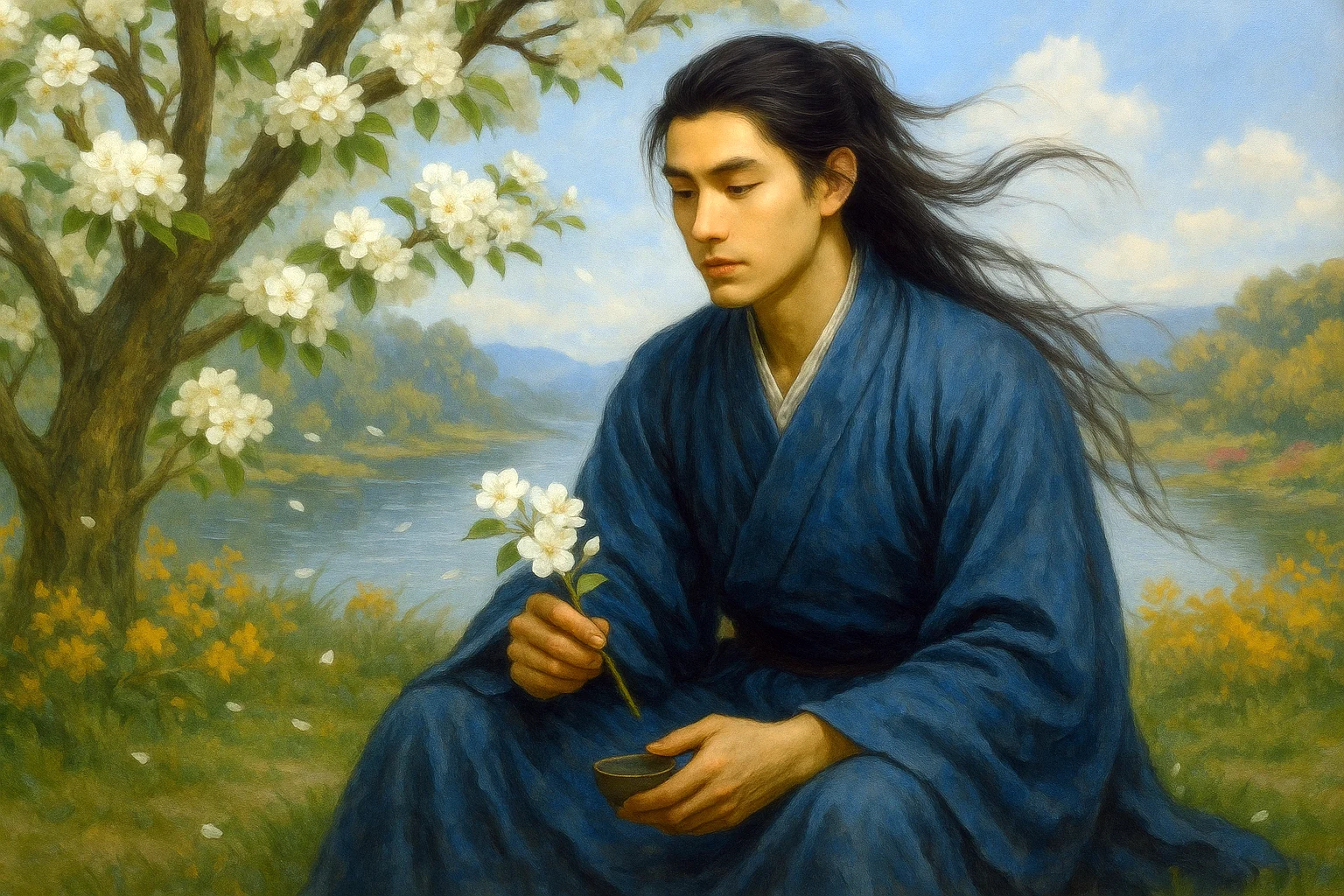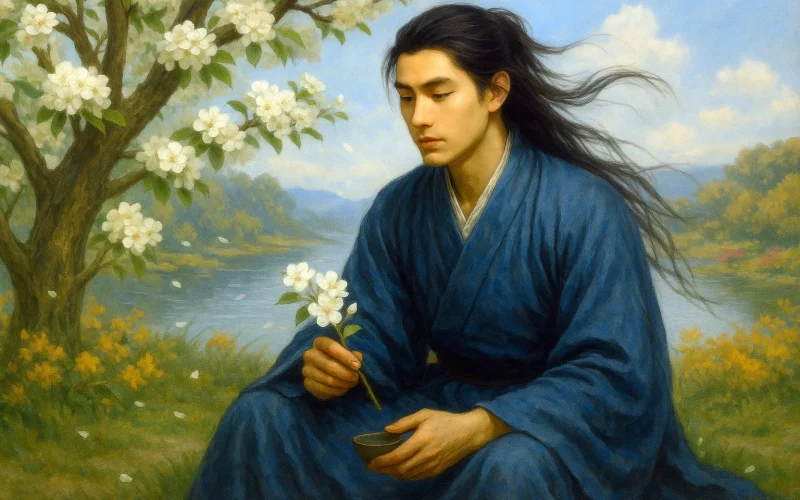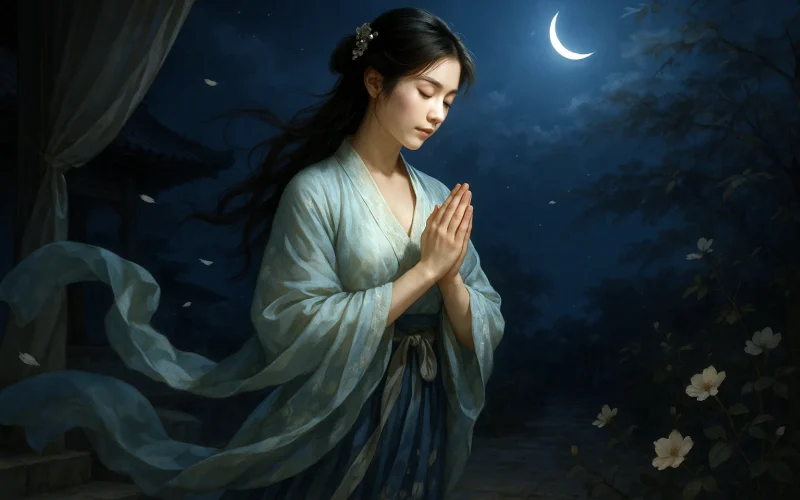The downpour ends, absorbed by mountain veins,
The slanting sun soaks Wangchuan’s quiet lanes.
I climb to view rainbows at dusk’s command,
Cross stepping-stones where blue springs kiss the land.
Purple vines shroud the sacred well’s retreat,
Yellow flowers burst through fields of wheat.
But knowing no road leads to fairy shores,
I retreat where humankind restores.
Original Poem
「雨后游辋川」
李端
骤雨归山尽,颓阳入辋川。
看虹登晚墅,踏石过青泉。
紫葛藏仙井,黄花出野田。
自知无路去,回步就人烟。
Interpretation
The exact date of this poem's creation is unknown, but it is likely a lyrical landscape work composed by Li Duan during his later years or reclusive period while traveling through the Wangchuan mountains and waters. Wangchuan, located in present-day Lantian, Shaanxi, was the hermitage of Wang Wei, known for its serene landscapes and ever-changing vistas, which inspired numerous literary works through the ages. Li Duan's piece can be seen as a tribute to Wang Wei's style—a poetic expression of his love for natural scenery and his yearning for a tranquil life amidst the turmoil of his era.
First Couplet: "骤雨归山尽,颓阳入辋川。"
Zhòu yǔ guī shān jìn, tuí yáng rù Wǎng chuān.
The sudden storm retreats into mountain folds; The waning sun descends into Wangchuan's embrace.
These opening lines paint nature's quiet surrender - the tempest yielding to the peaks, the weary daylight sinking into the valley's arms. The verbs "retreat" (归) and "descend" (入) trace the graceful withdrawal of elemental forces, while "waning" (颓) lends the sunset a poetic melancholy, as if the day itself were sighing into twilight.
Second Couplet: "看虹登晚墅,踏石过青泉。"
Kàn hóng dēng wǎn shù, tà shí guò qīng quán.
A rainbow ascends above dusk-kissed cottages; My footsteps trace the stones through jade-clear springs.
Here the poet becomes both witness and wayfarer. The celestial arch "ascending" (登) the evening village mirrors his earthly passage "tracing" (踏) the stream's liquid jewels. Each stone step resonates like a note in nature's silent music, the emerald waters (青泉) reflecting both sky's ephemeral wonder and earth's enduring beauty.
Third Couplet: "紫葛藏仙井,黄花出野田。"
Zǐ gé cáng xiān jǐng, huáng huā chū yě tián.
Amethyst vines guard the nymph's forgotten well; Golden blossoms crown the untamed meadow's breast.
Myth and meadow intertwine in this vision. The vines "guard" (藏) their sacred secret like temple curtains, while wildflowers "crown" (出) the wilderness in solar glory. These royal hues - imperial purple and sovereign gold - transform the landscape into a living reliquary, where every petal and tendril whispers of nature's divine ordination.
Fourth Couplet: "自知无路去,回步就人烟。"
Zì zhī wú lù qù, huí bù jiù rén yān.
Knowing no path leads beyond this paradise, I turn where chimney-smoke writes its humble calligraphy against the dusk.
The final revelation unfolds with quiet dignity. The poet's epiphany (自知) acknowledges nature's sublime indifference, while distant hearths beckon with their curling script of smoke. This homeward turn embodies the eternal dance between transcendence and belonging - the soul's flight always tempered by the body's need for warmth and companionship.
Holistic Appreciation
The poem captures a post-rain mountain excursion, unfolding naturally from the clearing storm and slanting sunlight to mountain rainbows, cascading springs, and wildflowers—before finally returning to the human world. Its rhythm is serene, its transitions seamless.
With delicate brushstrokes, the poet distills the essence of post-rain Wangchuan: verbs like "rainbows ascend," "springs traverse," "vines conceal," and "flowers emerge" animate the landscape, making mountains and waters pulse with life. Li Duan guides readers deeper into Wangchuan’s tranquility through the "I"-narrator’s footsteps, then pivots to reflection with "knowing no path remains"—preventing mere escapism.
The closing line, "Knowing no path remains, I turn toward human smoke," crystallizes the poem’s ethos. Though drawn to reclusion, the poet ultimately embraces the mundane, revealing a tempered wisdom that acknowledges limits. This mindset reflects the post-High Tang literati’s quiet retreat from shattered ideals into measured introspection.
Artistic Merits
The poem’s language is elegantly understated, its imagery pristine yet layered. Landscapes balance distant ("rainbows over evening hills") and intimate ("stepping stones across springs"), static ("immortal wells," "golden blooms") and dynamic ("rain ceases," "sunlight enters"). Structurally, it follows the qǐ-chéng-zhuǎn-hé progression: scenic lyricism in the first half yields to inner tension, culminating in the stark juxtaposition of "human smoke" with earlier "immortal wells"—symbolizing irreconcilable choices between worldly and ideal realms.
Emotion remains veiled yet resonant. This is both a nature vignette and a window into scholarly melancholy, epitomizing "emotion channeled through scenery."
Insights
Amid life’s chaos, we yearn for nature’s purity—yet such idylls often prove fleeting. The poet channels transcendence through Wangchuan’s rain-washed beauty but concedes reality in "turning toward human smoke." Here lies an aesthetic equilibrium: idealism tempered by clarity, a restrained yet tender struggle emblematic of classical literati at life’s crossroads. It is, ultimately, an act of reconciliation—both with the world and oneself.
About the Poet

Li Duan (李端, c. 743–785), a native of Zhaoxian in Hebei Province, was among the "Ten Literary Talents of the Dali Era" during the Mid-Tang period. He excelled particularly in five-character regulated verse, crafting poetry of refined elegance and subtle nuance. His works frequently explored themes of reclusive living and the melancholy of separation, with over 250 poems preserved in the Complete Tang Poetry anthology.











